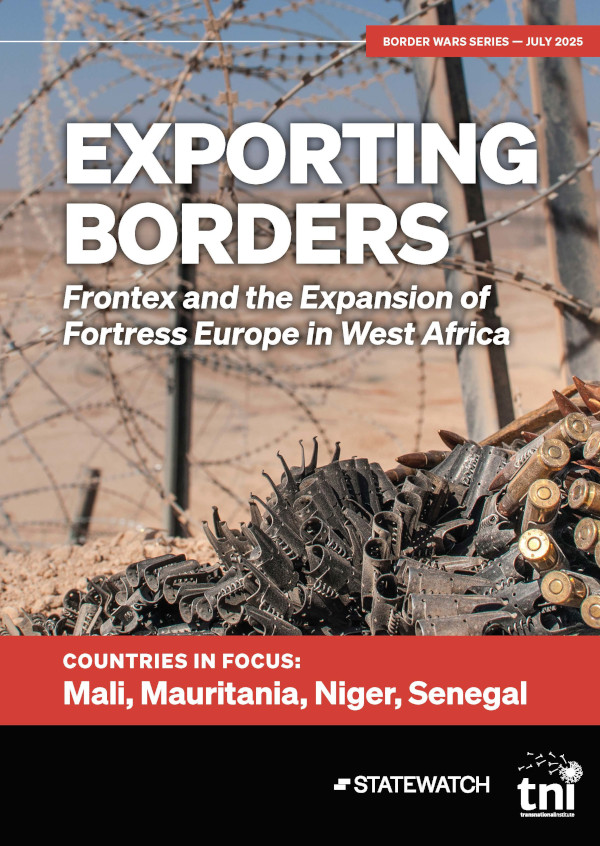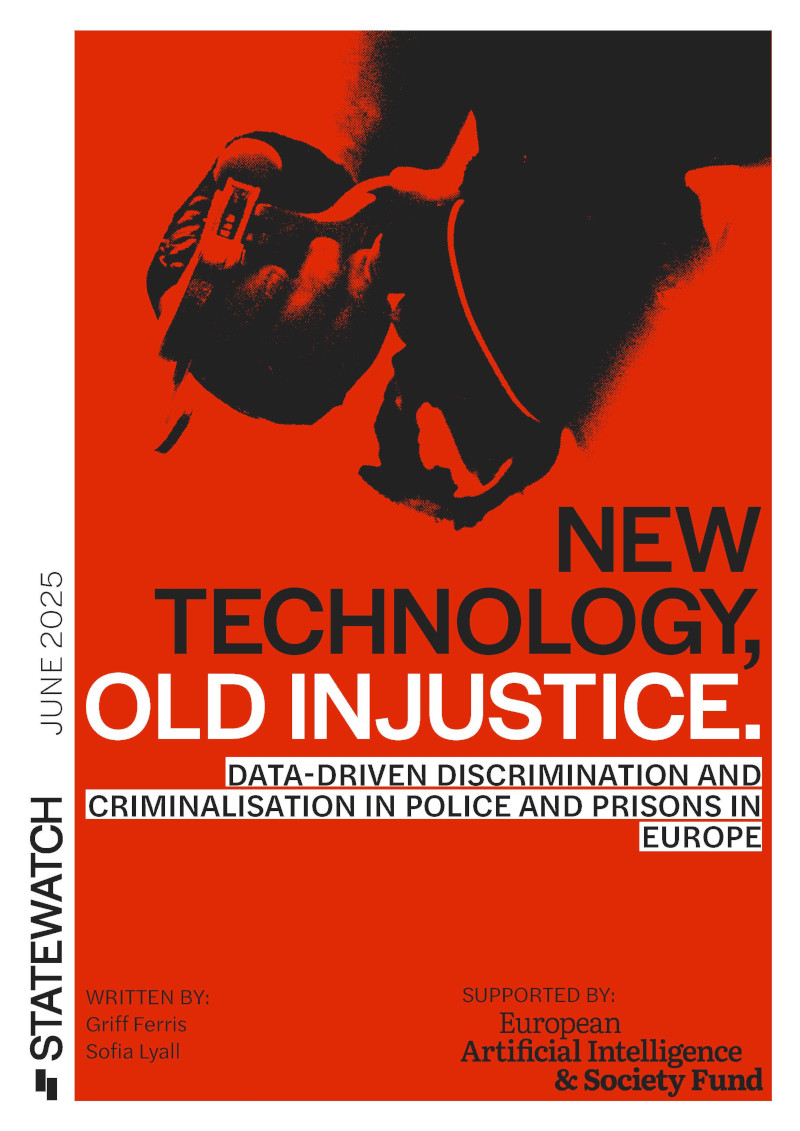Exporting Borders: Frontex and the Expansion of Fortress Europe in West Africa
Topic
Country/Region
10 July 2025
The EU is pushing its migration control far beyond Europe’s borders. This report, co-published with the Transnational Institute, exposes how Frontex operates in West Africa under the cover of cooperation, entrenching neo-colonial influence, undermining rights, and reshaping the Sahel into a securitised buffer zone.
Support our work: become a Friend of Statewatch from as little as £1/€1 per month.
Full report
Exporting Borders: Frontex and the Expansion of Fortress Europe in West Africa (pdf)
Summary and key findings
 The EU and its member states are shifting migration control outside the EU’s borders. This report shows how this externalisation strategy plays out in the Sahel region of West Africa under the guise of partnership and development cooperation. West Africa is the main priority region for EU security-migration-development cooperation. This report critically examines the evolving role of Frontex, the EU Border and Coast Guard Agency, as a central part of the EU’s broader strategy of border externalisation.
The EU and its member states are shifting migration control outside the EU’s borders. This report shows how this externalisation strategy plays out in the Sahel region of West Africa under the guise of partnership and development cooperation. West Africa is the main priority region for EU security-migration-development cooperation. This report critically examines the evolving role of Frontex, the EU Border and Coast Guard Agency, as a central part of the EU’s broader strategy of border externalisation.
The study, including extensive fieldwork, traces Frontex’s expanding operations in Mali, Niger, Senegal, and Mauritania, highlighting how these activities predate its formal mandate and have intensified alongside the agency’s growing powers and budget, taking more explicit and direct forms, evolving from behind-the-scenes involvement to increasingly overt and direct forms of intervention. The report situates these developments within the context of a rapidly shifting geopolitical reality in the Sahel, marked by political instability, armed conflict, and a rising resistance to European influence. As West African states express a growing anti-Western sentiment and sever ties with former colonial powers, this historical moment allows us to speak of an emerging fourth wave of decolonisation.
The report exposes the absence of effective accountability mechanisms, democratic oversight, and enforceable human rights safeguards in Frontex’s external actions. It argues that current practices not only infringe on migrants’ rights but also perpetuate colonial power asymmetries under the guise of cooperation. Far from fostering equitable cooperation, the EU’s approach reinforces a securitised and Eurocentric vision of migration control that undermines human rights and externalises legal responsibility. The cooperation between Frontex and West African states reflects a clear power imbalance, where EU funding and diplomatic pressure are used as leverage to push through migration control policies that primarily serve European interests.
This dynamic often sidelines local priorities and reinforces neo-colonial patterns of influence, where African states are treated less as equal partners and more as buffers against mobility. In effect, Frontex is reinforcing a new ‘hard border’ regime across the Sahel, traditionally a free movement zone, one that prioritises containment over protection, and surveillance over accountability. It risks entrenching neo-colonial patterns of control while weakening democratic and other accountability safeguards and the rule of law.
This report finds that:
- The EU’s border policies rely on a racialised construction of the African migrant as a security threat, conflating migration with terrorism, crime, and instability. This narrative legitimises exclusionary and repressive practices, with dramatic consequences for human rights.
- Migrants in West Africa face routine violations including arbitrary arrest, detention, refoulement, and extortion. In Niger, many speak of the Sahara as an “open sky cemetery” due to the deadly risks faced along migration routes.
- People who are not migrants are also affected, as increased surveillance and border restrictions disrupt trade, livelihoods, and everyday cross-border movement. Local communities face shrinking civil liberties and economic hardship under a system geared toward controlling mobility.
- Despite talk of equal partnerships, EU actions often reflect coercive dynamics rooted in colonial histories: instrumentalising aid, imposing visa sanctions, and prioritising EU geopolitical interests over local needs and agency.
- Frontex has been operational in West Africa since before its formal mandate allowed external action. Its involvement has grown significantly in tandem with the EU’s expanding externalisation strategy.
- Frontex’s growing presence in Mali, Niger, Mauritania, and Senegal, the focus countries of this report, focuses on capacity building, information exchange, and potential direct engagement with border surveillance operations on the ground. The agency’s activities have received little legal, political, or journalistic scrutiny, despite posing serious risks to human rights and local sovereignty.
- Frontex has built up extensive informal networks through the Africa-Frontex Intelligence Community (AFIC), a platform involving 31 African states. Through AFIC, Frontex coordinates surveillance, risk analysis, and operational planning with national authorities.
- Risk Analysis Cells (RACs), funded and equipped by Frontex, have been embedded in national border agencies in eight West African countries. These RACs collect, analyse data, which is shared with Frontex, enabling real-time monitoring and analysis of migration routes.
- In Mali, EU-funded infrastructure and training programmes are often unused. Local authorities are reluctant to fully cooperate on migration enforcement because migration supports livelihoods in border areas.
- The EU has attempted to negotiate status agreements with Mauritania and Senegal to allow Frontex to operate on their territory with full executive powers. These agreements would permit agents to carry weapons and grant them immunity from prosecution. However, due to among other factors, democratic and civil society pressure in both countries and in the EU, the negotiations are currently frozen.
- Across the region, Frontex’s presence is often informal and opaque, operating beyond the democratic and judicial radar. Working arrangements and AFIC cooperation are informal in nature, and therefore bypass judicial, democratic, and public scrutiny.
- EU support has also included funding for biometric ID systems, surveillance drones, wiretapping infrastructure, and phone-tracking technology. These tools have reportedly been used to target journalists, activists, and opposition groups.
- These developments directly undermine the ECOWAS free movement framework, which was built to support regional integration and economic mobility. The imposition of hard borders risks destabilising local economies and deepening inequality.
Read the full report: Exporting Borders: Frontex and the Expansion of Fortress Europe in West Africa (pdf)
Our work is only possible with your support.
Become a Friend of Statewatch from as little as £1/€1 per month.
Spotted an error? If you've spotted a problem with this page, just click once to let us know.

